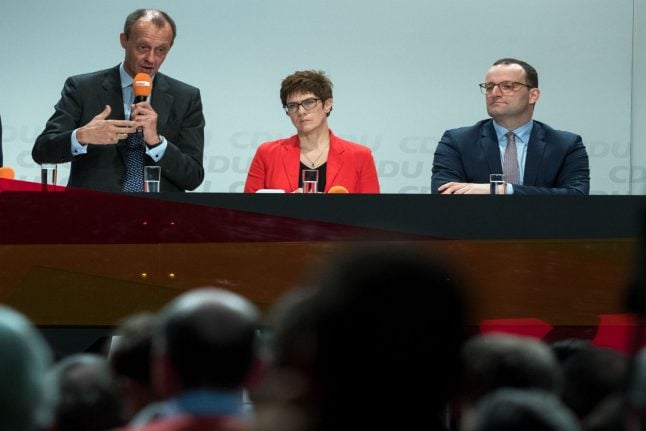Merkel's fateful decision in 2015 to keep Germany's borders open to asylum seekers had deeply split the country.
Mindful of the souring mood over the arrival of more than a million would-be refugees since 2015, the three hopefuls to succeed Merkel – party general secretary Annegret Kramp-Karrenbauer, Health Minister Jens Spahn and corporate lawyer Friedrich Merz – have gone out of their way to take aim at
migration.
Right-wing magazine Cicero noted that the “CDU is developing these days at breathtaking speed from a Merkel party to a people's party – because touchy subjects like flight, asylum or migration movements are increasingly being openly debated”.
“It is like in the Union, someone has thrown the window wide open to finally ventilate the stale air of the meek Merkel years.”
SEE ALSO: How the race to replace Merkel is breathing life into the CDU
'Populist approach'
Spahn, who has styled himself as a conservative anti-Merkel, has defiantly challenged her bid to sign a UN Migration Pact at a December summit in Morocco.
Arguing that such a text should not be signed “secretly,” he is seeking a vote at the party congress on the document, which he, like the US and Austria, oppose.
Merz meanwhile appeared to call into question the right of an individual to seek asylum, even though it is written into Germany's constitution in a bid to prevent a repeat of Nazi-era persecution.
SEE ALSO: CDU Candidate Merz calls asylum law into question
After earning sharp criticism from across the political spectrum, except from the far-right AfD which agreed with his position, Merz backtracked.
For the left-leaning daily TAZ, Merz's tactic is clear: he “pretends to be guided by reason but in reality, his approach is populist.”
But even Kramp-Karrenbauer, also known in Germany by her initials AKK and who is deemed the most moderate of the trio, said that when in doubt, Syrians who are convicted of crimes in Germany should be sent back to their home country even if war is still raging there.
The core principle guiding the UN refugee convention is that a refugee should not be returned to a country where they face serious threats to their life or freedom.
Further division
Finance Minister Olaf Scholz, a leading Social Democrat, condemned the tone of the debate among the hopefuls, saying that the “internal Union popularity contest is being played out on the backs of the weakest.”
Fellow SPD member, Foreign Minister Heiko Maas, warned that “running after right-wing populists would only lead to further division.”
Going by recent surveys, voters also appeared little impressed.
A latest poll commissioned by public broadcaster ZDF shows the CDU and sister party CSU with just 27 percent of support, down from the 32.9 percent the alliance scored in the 2017 election.
For news weekly Der Spiegel, “a winner of the CDU internal race for Angela Merkel's successor is already clear: the Greens.
“While the candidates are shifting further right … the ecologist party is speeding up their upward flight. According to latest surveys, it's as close as just three percentage points from the Union.”
SEE ALSO: Why is the Green party suddenly flying so high in Germany?




 Please whitelist us to continue reading.
Please whitelist us to continue reading.
Member comments